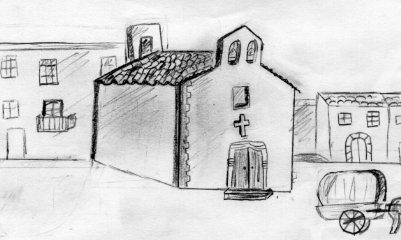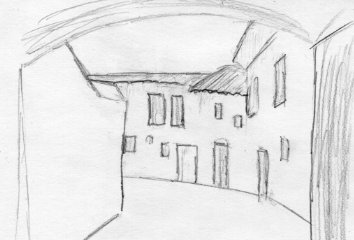El poble de Taradell,
que en l'actualitat compta amb 5327 habitants, a l'any 1872 tenia unes
1736 persones. D'elles només 987 vivien al poble. Hi havia 300
cases habitades i 36 de deshabitades.
La pesta de còlera (40 defuncions) i les guerres carlines (60 persones
varen marxar per participar-hi) varen fer disminuir la població.
A més cal afegir que no hi havia gaire indústria. Per aquest
motiu molta gent abandona el poble.
En les cases de pagès la situació no era tan dolenta ja
que es practicava l'economia de subsistència. Es collia: blat,
sègol, mill, blat de moro, ordi, mongetes, faves, cigrons i patates.
Pels carrers de la vila, empedrats o de terra, circulaven els carros en
el seu camí d'anada o tornada dels camps, del bosc, o de pobles
veïns. Menant el carro trobem el carreter. Aquest és un ofici
dur: carregar i descarregar; empènyer el carro quan s'encalla una
roda; aguantar el sol, el fred, el calor i el vent. Sol ser un home de
caràcter dur i brusc, bevedor, fumador, i també malparlat.
Però la intensa relació que hi ha entre ell i l'animal,
la feina del qual en depèn fonamentalment, li dóna d'altra
banda, una gran sensibilitat per a conèixer les necessitats de
la bèstia.
Carro, i cavalleries: mules, matxos, eugues, cavalls o someres i rucs
mai es deixaven al carrer. El primer que es procurava era tenir estable
on tancar els animals i deixar el carro. A l'entrada de casa, al cobert
o allí on fos perquè no hi havia res que els perjudiqués
més que la intempèrie.
En els baixos d'algunes cases trobàvem tallers:
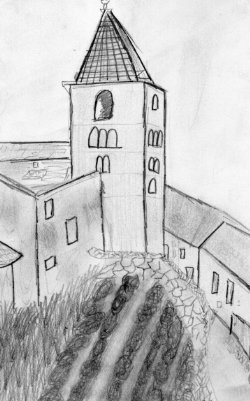
L'escloper que feia
els esclops fent servir fusta de pi, que és més calenta,
o de pollancre que és més lleugera. Els esclops eren molt
necessaris ja permetien caminar per llocs humits sense mullar-se els peus.
Eren ideals per treballar al camp, a l'hort o a la cort.
El ferrer,
que treballava el ferro per aconseguir fer objectes útils per a
la vida del pagès i del camp.
El carreter encarregat de construir carros. Aquest ofici requeria aprenentatge
llarg i experiència. Havia de conèixer bé la fusta
que s'emprava, ajustar-la a les diferents parts del carro i aconseguir
que tot anés a la perfecció. Tenien molt prestigi. Que en
molts casos provenia d'una llarga tradició familiar. El que ara
en diem un "saga".
En algun terrat o en l'entrada d'alguna casa podíem veure el matalasser
fent o refent els matalassos que no sempre eren de llana sinó que
podien ser de palla o pellofes.
A més d'aquests, diguem-ne petits empresaris, hi havia els paraires.
El seu ofici consistia en treballar la llana fins a deixar-la a punt per
a ser teixida.
La vida al camp, en una casa de pagès, era molt diferent. Les famílies
eren, normalment, bastant nombroses. Pares, avis, nets, oncles i tietes
convivien sota un mateix sostre compartint vida i feina.
Es comença a fer de dia, no sona cap despertador. És 1872
i canta el gall.
La gent de la casa es desperta i es vesteix corrents. Hi ha molta feina
per fer i a més fa fred.
Mentre els homes arreglen el bestiar i es munyen les vaques s'acaba de
llevar la resta de la família. A la cuina, plena de fum (la llar
de foc no va massa bé), s'està preparant l'esmorzar: farinetes,
pa, algun tros de coca i llet.
Després d'esmorzar els homes marxen cap a la seva feina: al camp,
a l'hort o amb el ramat. A mig matí un petit descans per fer el
traguinyoli.
A casa també hi ha coses a fer: gallines, conills, ànecs
necessiten neteja i aliment. A més cal netejar, rentar (sense màquina),
cosir (apedaçar i sargir), filar la llana per després fer-ne
mitjons, pastar el pa i cuinar.
A l'hora del dinar un bon plat de caldo i carn d'olla i... a continuar
la feina. En una casa de pagès no s'acaba mai.
Al vespre s'ha de tornar a munyir i arreglar el bestiar; després
sopar: patates, mongetes o sopes de pa amb un tall de cansalada, botifarra
o pilotilles confitades.
Asseguts a la vora del foc s'acaba el dia. El rosari, les últimes
xafarderies i alguna història abans d'anar a dormir.
Bona nit. Demà serà un altre dia.
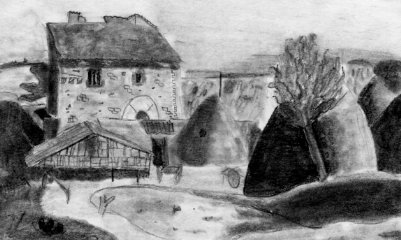
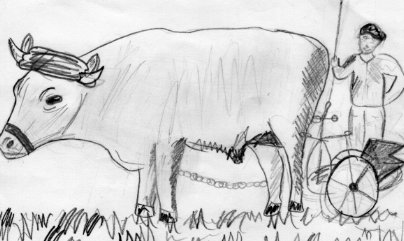
Taradell cuenta
en la actualidad con 5327 habitantes. En 1872 tenía 1736 personas
censadas. De ellas solo 987 vivían en el pueblo ( 300 casas estaban
habitadas y 36 deshabitadas).
La peste del cólera (40 fallecidos) y las guerras carlistas (60
hombres marcharon para participar en ellas) hicieron disminuir la población.
Además no había casi ninguna industria, por este motivo
mucha gente abandonó el pueblo.
En las masías la situación no era tan mala ya que se practicaba
la economía de subsistencia. Se cultivaba: trigo, centeno, cebada,
mijo, maíz, judías, habas, garbanzos y patatas.
Por las calles de la villa, empedrados o de tierra circulaban los carros
en sus viajes de ida y vuelta del campo, del bosque o de los pueblos vecinos.
El carretero conduce el carro. Este era un oficio duro: cargar y descargar;
empujar el carro cuando se encalla una rueda; aguantar las inclemencias
del tiempo. Es un hombre de carácter duro y brusco, fumador y bebedor
y también mal hablado.
Pero por otro lado, su intensa relación con el animal con el que
trabaja le da una gran sensibilidad para conocer las necesidades de la
bestia.
Ni el carro ni las caballerías se dejaban nunca en la calle ya
que la intemperie las perjudicaba mucho. Por este motivo siempre se procuraba
tener un establo y un almacén donde dejarlos.
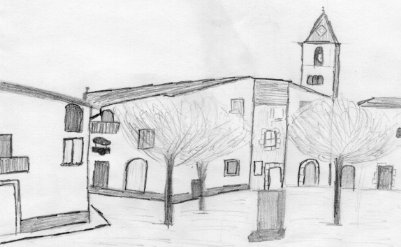
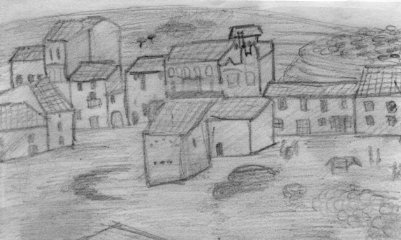
"Escloper" que hacía zuecos (utilizando madera de pino que es más caliente o de chopo que es más ligera) Los zuecos eran muy necesarios ya que permitían caminar por lugares húmedos sin mojarse los pies. Eran ideales para trabajar en el campo, en el huerto, en las pocilgas y en los establos.
La herrería donde se trabajaba el hierro para conseguir objetos útiles para la vida del campesino.
El taller del carretero donde se construían los carros. Este oficio requería un largo aprendizaje y experiencia. Era necesario conocer muy bien la madera, ajustar con exactitud las diferentes partes del carro y conseguir que todo funcionara a la perfección. Solían tener gran prestigio y en muchos casos éste provenía de larga tradición familiar. Sería lo que en la actualidad llamamos una "saga"
En la terraza o en la entrada de alguna casa se podía ver al colchonero haciendo o rehaciendo colchones. Los colchones no siempre eran de lana sino que podían ser: de paja o de cáscaras.
La vida en el campo, en las masías, era bien distinta. Las familias solían ser bastante numerosas. Padres, abuelos, nietos, tíos y tías convivían a menudo bajo un mismo techo compartiendo vida y trabajo.
Está clareando, comienza la jornada. No suena ningún despertador. Es 1872. Canta el gallo.
Los habitantes de la casa se despiertan y se visten rápidamente. Hay mucho trabajo y además hace frío.
Mientras los mayores acomodan el ganado y ordeñan las vacas se acaba de levantar el resto de la familia.
En la cocina, llena de humo (el hogar tira poco), se está preparando el desayuno: "farinetes" (sémola de maíz muy espesa), pan, algún trozo de torta y leche.
Después del desayuno los hombres se van al campo, al huerto o con el rebaño. A media mañana harán un pequeño descanso y seguramente algún trago.
En casa también hay cosas para hacer: gallinas, conejos y patos necesitan limpieza y alimento. Además hay que limpiar, lavar (sin lavadora), coser (remendar y zurcir), hilar la lana para después poder tejer calcetines. Y no olvidemos que se debe pastar el pan y cocinar.
A la hora de la comida "caldo i carn d'olla" (cocido) y ... de nuevo al trabajo. En una casa de campo nunca se acaba.
Al atardecer hay que ordeñar de nuevo y volver a acomodar al ganado; después la cena: patatas, alubias o sopas de pan con un trozo de tocino, butifarra o albóndigas confitadas.
Sentados alrededor del hogar se acaba la jornada: el rosario, los últimos cotilleos y alguna que otra historia antes de irse a la cama.
Buenas noches. Mañana será otro día.
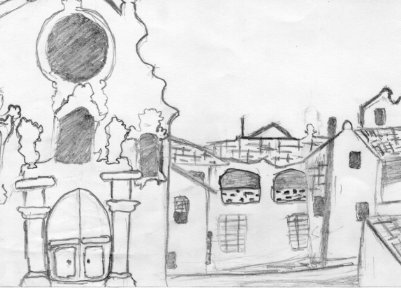
The pest and epidemics (40 deaths), the "carlina" war (60 people went out to fight) decreased the population.
In the farms the situation was better because they had a subsistence economy. They harvested: wheat, rye, barley, millet, maize, beans, broad beans, chick peas and potatoes.
On the village streets the carts passed. The cart driver was hard job: to load and unload, to push the car when the wheels have any problem, to work under the sun or when the weather is cold, hot or windy. Usually he was a hard and rude man, drinker, smoker and with peculiar language (people say: you swear like a trooper).
At the same time he has a specially sensibility to know what his animal needs because he works every time with it.
They never left carts and animals to sleep out of doors, because the inclemency are very prejudicial to them.
An artisan made wooden shoes (he uses pine wood , hotter or poplar wood, lighter). The wooden shoes were very necessary because they protected feet. People could walk on humid places. They were perfect to work in land, in vegetable garden or in the stalls.
The blacksmith worked with iron and he made tools to farmers.
Cartwright made carts. It was a very difficult job. It was necessary long experience and long apprenticeship. They needed know the wood, how to adjust the different parts. They had big prestige and sometimes the job was legacy familiar.
We can see the mattress maker also.
The life in the land, in the farmers, was very different.
The families usually were very numerous. Parents, grandparents, grandchildren, uncles and aunts lived together.
The day starts. The alarm clock doesn't ring. It's 1872, the cock sings.
The people, in the house wake up, they get up and dress quickly. There is a lot of work to do and it's cold.
While men cleans and milk the cows the young people get up. In the kitchen, full of smoke, breakfast is preparing: "farinetes", bread, a piece of cake and fresh milk.
Later men go out to work at the land, in the vegetable garden or with the flock or herd.
At home there were work to do: chicken, rabbits and ducks need food.
It's necessary to clean and wash (there isn't washing machine), to sew (to patch and mend), to spin the wool and later to knick socks, to knead and cook.
They have lunch "caldo i carn d'olla" and they come back to work again. In a farmer they don't never finish.
On the evening they milk and prepare cows another time. Then they have dinner: potatoes, beans or bread soup with bacon or sausages.
When they finish they sit around the fire place and the say the rosary. They talk about the last news or tell some history until the bed time.
Good night. Tomorrow will be another day.
